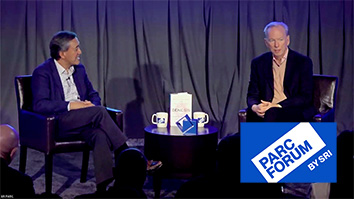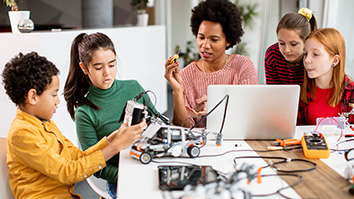Citation
Christensen, C., Silander, M., Maxon, T., & Gutierrez, J. (2018). Why does the rain fall down instead of up? How parents support science learning, and how media can help. The joan ganz cooney center at sesame workshop.
Abstract
In Jackson, Mississippi, researchers visited a family of seven (including a niece and nephew), headed by a stay-at-home mom in her 20s. During the visit, the children sat around the mom as she described their latest learning activities, including 1-on-1 homework time and making “slime.” One activity—planting a seed in the yard in front of their apartment building—garnered a lot of excitement. Here’s how the mom described her family’s experience.
“[My son] wanted to know, ‘How did that tree get in the ground?’ … What I did was, like, when I was in school with my teacher, we grew a plant. So that’s what we’re doing in my house now, growing a plant, so he can see. I told him it wouldn’t get as big as the trees are, but he could see it grow.
I Googled ‘How to plant a plant’… to make sure that I was doing it right. I hadn’t done it in a while, so I wanted to make sure it would sprout. … Google always leads you to YouTube. So we looked at a video showing us how different people started planting different types of things, and how to take care of them. … I wanted to make sure that it was getting everything that it needed.”
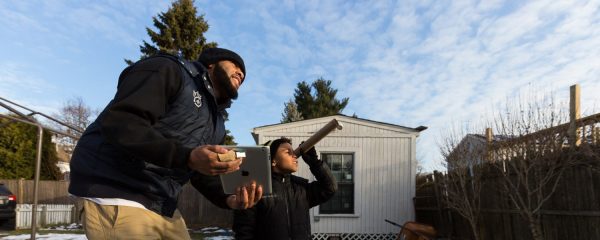
Science-related media have the potential to engage and support families in exploring science together, but are families using media for this purpose? A new study examined the ways that families think about and engage young children in science, and how they use science-related media to support these efforts. The study was conducted by EDC and SRI International and commissioned by the U.S. Department of Education’s Ready To Learn initiative, led by the Corporation for Public Broadcasting and PBS. It included a nationally-representative survey of over 1,400 parents and caregivers of 3- to 6-year-old children, and interviews with 65 parents.
Findings from the survey suggest that most parents feel responsible for helping their children learn, and that they do so daily. Most parents feel very confident helping their young children learn social and behavioral skills, math, and literacy. But only about half of parents—and even fewer low-income parents—feel very confident helping their children learn science.
Not only are parents less likely to be very confident in doing science with their children, they are also less likely to do science with their children daily, compared to other skills. When asked about learning activities they do with their children, parents were most likely to report that they read, involve their children in chores, and work on math concepts with their children every day; far fewer parents report doing science learning activities daily. Many parents, especially low-income parents, say that more ideas and resources would help them to do more science with their children.
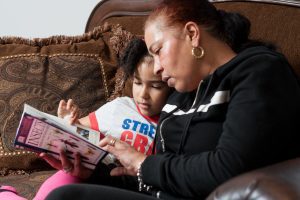
Media could fill that need. Close to two-thirds of parents reported that their child had watched science-related TV shows or videos weekly or more often in the past month, and about half of parents said their children played science-related apps or video games about science weekly or more often.
Based on these findings, we offer some suggestions for media producers—and others who develop resources for families—to help families with young children explore science together.
Finding: Nine out of ten parents report doing learning activities with their children daily. About half of parents report doing science-related activities with their children daily. Parents indicated that easy-to-do ideas for science activities would help them do more science.
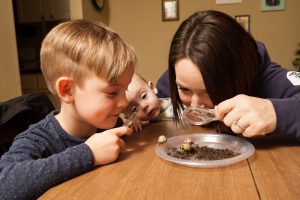
Media can model or encourage everyday ways to engage children in science. Media can also remind families that they probably already do science without realizing it.
- Show that science is everywhere. Science doesn’t require special supplies or set-up. Media can show characters listening for birds while running errands, building with empty cartons and containers, or exploring rolling and sliding with a piece of cardboard and different-shaped household objects.
Finding: Most parents do not feel that their child is learning science from media.
Our interview data suggest that parents may not always recognize the educational value of science media. Clear science content may help parents recognize and support what their children are learning. Here are three research-based strategies.
- Begin with a preview of the science activities and concepts featured in the episode (an advance organizer). For example, “Today we’re building things. We will see what makes some things stable, and some things wobbly.
This introduction can help children and parents focus on the educational content. Similarly, end with a wrap-up of what the characters did and found out related to the science content. - Integrate science content into the narrative, rather than saving it for interstitials. This approach helps parent and children to engage in the science content throughout the episode. It also helps families realize that they naturally experience science as a part of life, much like the characters do.
- Raise the same science concepts in different ways, using multiple examples throughout the episode or game. Use a variety of visuals, sound, spoken language, print text, and/or other symbolic representations to reinforce concepts. For example, an episode about habitats could include pictures of a habitat, language that describes the habitat, and text or symbols to represent different animals or habitats.
Finding: About 30% of parents do not talk to their child about connections between science media and science in everyday life.
Media can support these conversations by providing discussion prompts for parents and children to use during or after the episode or game. Here are three tips for writing discussion prompts.
- Keep conversations open-ended. Focus on topics that are interesting to children, rather than on specific facts. For example, identify each family member’s favorite colors on objects around you.
- Encourage children to relate content to something else they have done or observed, since prior knowledge improves children’s comprehension. For example, “The episode/game was about plants. What plants do we see around where we live?”
- Launch related explorations in the real world. For example, a prompt might state, “This episode/game was about how the parts of a plant help it grow. Let’s find (or draw) a plant and look for it’s different parts.”
Media have a strong potential to support science learning at home. Families are already using science media, although they may not consider its educational value. If crafted intentionally, science media can engage parents in co-learning with their children, boost parents’ confidence in doing science, and suggest ways to continue learning off-screen.
